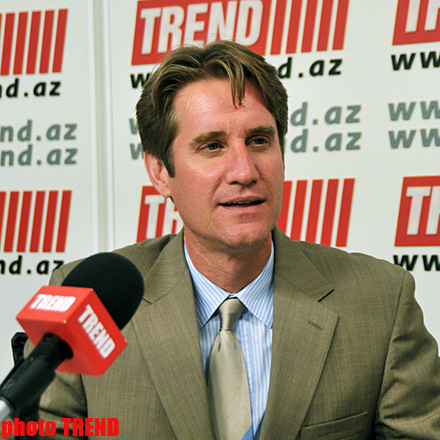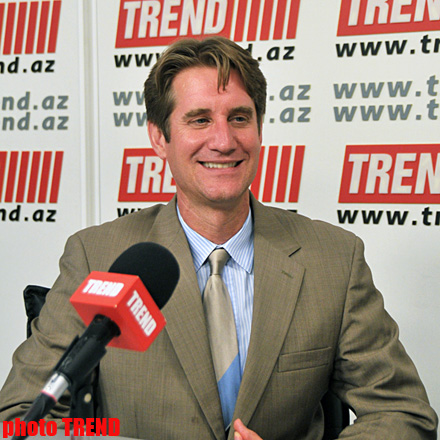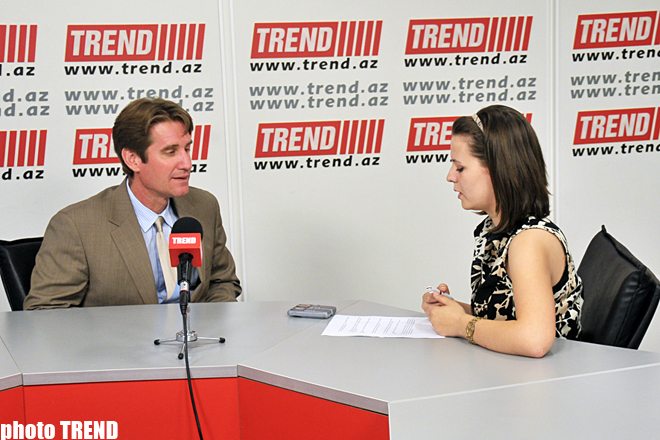Azerbaijan, Baku, June 29 /Trend, V.Zhavoronkova/
US-Azerbaijani relations are strong and are growing stronger, the US Ambassador to Azerbaijan Matthew Bryza said in an interview with Trend on the eve of the U.S. Independence Day, celebrated on July 4.
"We did go through a difficult period for several months but I strongly feel that we not only have come out of the negative trend but we've built on an already existing strong foundation and we are moving forward," he said.
He said the US and Azerbaijan are sharing three sets of strategic interests: interests in security, in energy and in internal reforms.
"Not in any particular order, just three broad sets of interest we believe need to keep moving forward together at the same time so that we can achieve our broad strategic goals and so we can have a stable and deepening partnership," he said.
Security dialogue
Last Friday's bilateral security dialog was very positive and achieved several concrete results, said Bryza.
"One is that we are going to accelerate our cooperation to help Azerbaijan protect its critical energy infrastructure. Two - move ahead with some military exercises and cooperative programs including one that will take place in Romania in August, one other one will be in Germany involving a hundred and more Azerbaijani solders with the NATO partners," said the ambassador.
He said the sides also had a chance in depth to exchange US and Azerbaijani views on how to work together to achieve common strategic goals and even how to find those common strategic goals.
"And it is important to do this with allies and friends, and partners from time to time because if we don't together work through what our goals. Sometimes we don't understand the prospective of the other side in persuade of a goal we thought was a common goal. So we need to make sure we have the same strategic goals from time to time and then adjust our tactics and our perceptions of the other side so we understand actions each other may have taken over the last few months. And that we did very successfully last Friday," said the US Ambassador.
Cooperation in Caspian
The US has been working for years with Azerbaijan and the international companies at investing in Baku-Tbilisi-Ceyhan and in the South Caucasus gas pipeline to help ensure that the physical security of those projects will be maintained, the Ambassador said.
"Now we realize that offshore on the Caspian sea there are a limited number, small number of very important pieces of infrastructure like oil and gas platforms and underwater pipelines that are responsible for huge amount of wealth generated in this country," said Bryza.
And they are also very responsible to our European allies as they diversify their supplies of natural gas as well as oil, he said.
"So what we can do is help our Azerbaijani partners and friends understand how we've dealt with risks that we didn't anticipate. We had things happened as we always do in any country, we never would of imagine like what happened in a Gulf of Mexico with that major oil spill," the Ambassador said.
"So we dealt with issues like that exact one, we did some things not very well, we did some things really well, and we would like to share that experience with our Azerbaijani partners and then help our Azerbaijani friends and partners to find what risks they may not ever accounted for and at the same time help them think through how better to address the risks they have accounted for," Bryza said.
And as we go through the process in a scientific way it will become clearer what equipment, what technologies that are available on the open market could be particularly useful to Azerbaijan, the Ambassador believes.
"So then we want to help our Azerbaijani friends and partners to find those technologies and equipment needs as well. So it is a process that will be ongoing for some time and is similar to a process that we conduct with very close friends also in other regions, Persian Goal frankly," said Bryza.
Results of Kazan meeting of presidents
Presidents Obama, Medvedev and Sarkozy were clear about their hopes for this meeting when they made their statement in Deauville saying that now is the time to resolve the conflict, to finalize the sheet on 'basic principles', to provide the foundation for a peaceful settlement of the conflict, Bryza said.
And they also made clear our long standing view that there is really no settlement of the Nagorno-Karabakh conflict that will last other that a peaceful negotiated one, said the Ambassador.
"So the parties didn't reach that breakthrough to finalize the basic principles just now in Kazan. But my understanding is the negotiations are continuing, the process continues, and the sides will meet again and will try to work through the issues that are remaining on the table," said Bryza, who earlier was the US co-chairman of the OSCE Minsk Group.
"The support of our President I think is very important: President Obama as you know called President Aliyev and President Sarkisan just a couple of days before Kazan. President Medvedev has been involved personally and President Sarkozy also made his hopes and his commitment to moving this process forward just before Kazan. So I would anticipate that sort of Presidential level support will continue," he said.
Economic development of Azerbaijan
Everyone knows about oil and gas and that is an area that is succeeded not only because Azerbaijan has oil and gas but because of very wise strategic and tactical decisions taken by the government of Azerbaijan, said Bryza.
He said of course it all began with the Contract of the century in 1994 when Heydar Aliyev invited so many foreign companies in to help develop the oil and gas sector and to bring the world's most advanced technologies to Azerbaijan.
And that continued throughout the years with the government of Azerbaijan ensuring that the sphere of oil and gas was in some ways nursed and encouraged and even protected from some problems that other spheres of the economy encounter, the Ambassador believes.
I think it is possible to do something similar now in the area of agriculture. Azerbaijan besides these last few years of large scale oil and gas development and aside from 1880s to the early 1900s has been an agrarian economy, Bryza said.
He said it is critically important that Azerbaijani government continues the investments it has been making in agriculture. It is critically important that there be partnerships with agro business from United States and Europe.
"And it is also vitally important that the international community and most importantly the government of Azerbaijan do everything possible to help those farmers become more efficient, to work together to ensure they get fair prices for their agricultural products and they become integrated in the value chain that is necessary for small farmers to become small entrepreneurs who get fair prices for high quality products. So there is a lot to be done in agriculture, I find it very exciting field," said the Ambassador.
He said there is a lot to happen on information technology.
"We pleased that Azerbaijan has decided to purchase a satellite from the American company "Orbital sciences" a communication satellite," he said.
Ali Abbasov, the Minister of communication and information technologies, is very innovative and he has established strong partnerships with American information technology companies, Bryza said.
"We would like to see that continue," said the Ambassador.
He said also the area of transportation is one which can be strong and deepening partnerships for American investors with Azerbaijani counterparts. There are road construction projects, but also international port that is going to be developed in Alat. It is a Netherlands' company that is leading the engineering, but there will be many opportunities for foreign and American companies, the Ambassador.
"Another area of cooperation could be air transportation, large scale cargo transportation from Azerbaijan as a hub eastward. It could be Afghanistan as it is happening now or beyond to China and Far East. There is a lot to be done with the surface transportation and air transportation. There are a lot of opportunities for American companies," he said.
Trans Caspian gas pipeline
Compared to where the overall question of exporting Caspian gas to Europe was in 2005 and 2006, he said.
"There has been a dramatic set of activities, set of changes the strategic map and a commercial map in this part of the world and in Europe in a profound way and that is great. That is great for everyone," said Bryza.
Countries in Europe and companies from Europe are working with Azerbaijani partners to increase competition for European gas markets, he said.
"That is a great development for everyone. That is great even for those competing at the same time for those European markets in Russia. Because over time competition makes companies more competitive, more effective, stronger, and this is good for everyone" he said.
Similarly on Trans Caspian, we in United States and our European Union allies who will consume the gas believe it makes sense for some volume of gas from the Eastern side of the Caspian Sea to come to Europe via the Southern Corridor, said the Ambassador.
Of course, it doesn't make sense for all of that gas to come Eastward, but some of it. Some of it is just situated in deposits in the Caspian Sea or near the Caspian Sea for which the most economical mode of export is across the Caspian Sea.
And the United States will not consume any of the natural gas probably ever because it will all go to Europe, said Bryza.
"But we have an interest in our friends who produce the natural gas being able to decide their own future, their own destiny as independent states that we respect. If they decide to send gas in one direction or another, we believe they should have a right to do so, and we hope some will make its way to Europe. And we can only hope that they will find a way to do this as the states themselves have said regardless of what they ultimately decide where to draw their boundary," said Bryza.
Ambassador Matthew Bryza: US and Azerbaijan are sharing three sets of strategic interests (PHOTO, VIDEO)
US-Azerbaijani relations are strong and are growing stronger, the US Ambassador to Azerbaijan Matthew Bryza said in an interview with Trend on the eve of the U.S. Independence Day, celebrated on July 4.

Get the Flash Player to see this player.










